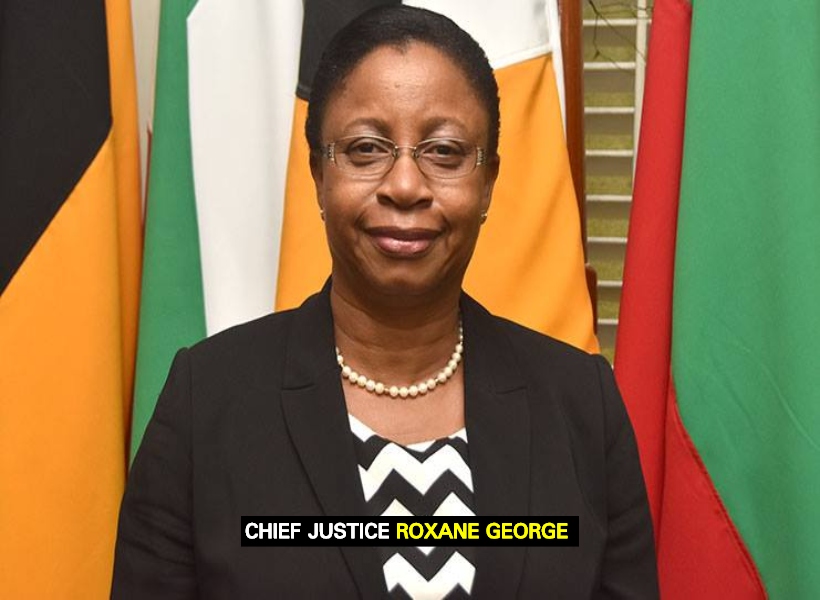Any questions relating to the constitutionality of electoral laws are to be determined by way of an election petition pursuant to Article 163 of the Constitution. The foregoing was affirmed by Chief Justice Roxane George, who in arriving at this conclusion placed heavy reliance on case laws and a recent ruling by the Court of Appeal in a case filed by government supporter, Eslyn David, who sought to block the declaration of the Recount results.
Questions as to the constitutionality of this piece of the law were raised by another government supporter, Misenga Jones, who now wants the courts to block the Guyana Elections Commission (GECOM) from declaring the results of the March 02,2020 elections using the votes tabulated during the Recount exercise. Jones, through her lawyers Senior Counsel Jerome Jeremie and Mayo Robertson, is insisting that GECOM is mandated by law to only use the 10 declarations by the Returning Officers to declare a President.
The basis for Jones’ request is that Order No.60 of 2020, otherwise known as the Recount Order, which was issued under the purported authority of Section 22 of the Elections Law (Amendment) Act, is unconstitutional and void. Jones argues that Section 22 of the Elections Laws (Amendment) Act is flagrantly unconstitutional in that it violates the principle of Separation of Powers and impermissibly usurps the legislative function of Parliament.
Similarly, Jones further argues that any Recount purportedly carried out under Section 22 of the said Act is unconstitutional, void and of no effect and that the recent ruling of the Caribbean Court of Justice (CCJ), effectively invalidated any report generated by the recount process as being usable in the tabulation of valid votes.
According to Jones, Section 22 of the Elections (Law Amendment) Act is unlawful because it confers law-making powers on GECOM, a non-legislative body, and is in contravention of Article 170 of the Constitution of Guyana which provides for Parliament to be the law-making body and it points out that Article 160 gives Parliament the power to enact laws with respect to the electoral system.
Parliament cannot transfer or delegate its powers to another entity, and in this case, in conferring on GECOM, an arbitrary law-making power, has abdicated its law-making powers, Jones further argues. In this regard, the government supporter submitted that the enactment of Section 22 of the Elections Law (Amendment) Act offends the Separation of Powers doctrine, as it permits GECOM the powers to amend laws even when in this case, Parliament is dissolved.
In arriving at her decision, the Chief Justice reminded that the Court of Appeal held that the legality of Section 22 of the Elections Law (Amendment) Act is a matter to be frontly examined by the court at a full hearing. Justice George noted while referring to specific case laws, that the High Court refused to examine the constitutionality of election-related legislation during the election period, allocating such questions to an election petition pursuant to Article 163 of the Constitution.
According to Justice George, the Court of Appeal held that “Such a determination would be disruptive to the electoral process. Moreover, it is well established that constitutional questions can be determined at the hearing of an [election] petition.”
Moreover, the Chief Justice emphasized that the Court of Appeal held that if GECOM had utilized or utilised its powers under Section 22 unlawfully, then this would be a question for determination at the filing of an election petition. Further to that, the Chief Justice dismissed arguments by Jones that the Court of Appeal’s decision on Section 22 obiter dicter (not legally binding), and cannot be accepted.
Citing further case laws, Justice George held that the determination of obiter dicter would vary depending on the circumstances in which those dicta fell and that although considered dictas by appeal courts do not strictly bind lower or equal courts within the judicial hierarchy, they must be afforded great wait and should only be departed from only with the greatest of caution.
“The decision of the Court of Appeal on Section 22 cannot be considered obiter dicter or a passing comment. The pronouncement of the Court of Appeal was definitive and considered finding based on a point that was clearly argued,” Justice George noted in her written judgment.
The Chief Justice, therefore, ruled that the Court of Appeal, having found that a challenge to Section 22 is one for an election petition, the principles of res judicata apply. Res Judicata is a Latin term, which means that the issue as to the constitutionality of Section 22 was already raised and determined by the Court of Appeal. And that the High Court cannot further make any pronouncement on the issues since it is bound by any decision of the Court of Appeal.
“I cannot discern any distinguishing features that would permit me to depart from this judgment, nor has any evidence been disclosed in the affidavits by or on behalf of the applicant [Jones] such as to permit me to depart…” Justice George held.













